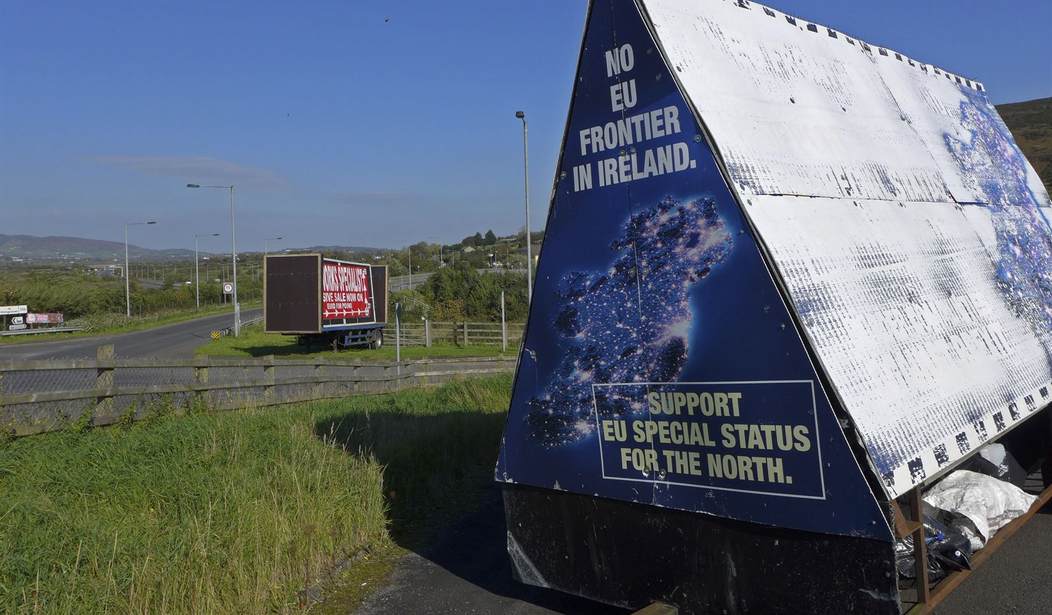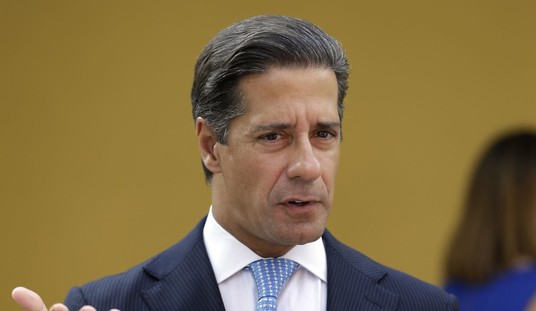The elections in Northern Ireland produced the political earthquake that the polls predicted — but what will happen when the ground stops shaking? For the first time since partition, a nationalist party has gained the most votes in an election — and not just any nationalist party, but Sinn Féin, the party that long served as the political wing of the Irish Republican Army. The formerly dominant unionist party, DUP, dropped into second place by eight points, 29%/22%, and fell seven points from its 2017 results:
Sinn Fein is set to romp home far ahead of the DUP in the Assembly election with Michelle O’Neill becoming First Minister if a new Executive is formed.
Despite speculation the race to be Stormont’s biggest party could be close, Sinn Fein will win at least 27 seats, with the party in contention for two more in Upper Bann and East Londonderry.
With the DUP losing MLAs in Strangford and North Down, it cannot catch its republican rival.
Vote-counting in Northern Ireland is as complicated as its politics. Voters use a form of ranked-choice balloting to choose a proportional-representation result, a system called Single Transferable Vote. They can rank as many as five candidates on their ballots, with lower rankings calculated as candidates get sifted out. This explainer gives a good look at why the numbers will take a while to get finalized:
Under STV, instead of a majority of votes, the winning post for the candidates is the quota – the number of valid votes cast divided by the number of seats plus one, plus one vote.
In all of the Northern Ireland constituencies, this comes to a sixth of the votes plus one vote. Any candidate passing the quota at any stage during the counting is elected.
Voters are asked to number candidates on the ballot paper in order of preference. The count then involves distributions of votes through many rounds.
Candidates passing the quota are declared elected and the number of their votes above the quota are distributed to others in accordance with their supporters’ lower preferences as they have expressed on the ballot paper.
Low-scoring candidates are progressively eliminated, with their votes distributed to others in accordance with lower preferences.
Get the picture? It may be several days before we know precisely how many and which seats Sinn Féin controls. We know, however, that they will have the largest number of seats and therefore will get to name the First Minister, putting republicans (small R!) in nominal charge of Northern Ireland for the first time. DUP will control the second-largest number of seats and will appoint the Deputy First Minister. That is, they will if DUP chooses to participate in the government; when it became clear that SF would win, some DUP leaders suggested they would refuse to form an executive and force the UK to conduct direct rule and hold another election.
That seems like a remote possibility, since DUP’s fortunes aren’t going to be improved by a sour-grapes stunt, but never underestimate the ability of politicians to shoot themselves in their feet.
Assuming that Stormont forms as prescribed with Sinn Féin holding the executive, does that mean Irish unification is at hand? It certainly makes the prospect possible. According to the Good Friday Agreement (GFA), the UK and the Republic of Ireland must allow a referendum on the question if both governments see a likely majority for reunification on both sides of the border. The chances of a unionist Northern Ireland government admitting to such a majority sentiment were just about nil. Putting the republicans in charge at least boosts the chances that the Northern Ireland government could call for a referendum.
If they do, they’d likely get it. Tory party chair Oliver Dowden declared that Boris Johnson’s government will honor that GFA pledge if those circumstances arise:
Mr Dowden insisted on Friday it was too early to start talking about a referendum on Northern Ireland’s future.
However, he conceded on Sky News: “If there is a sustained majority nationalist opinion in favour of a united Ireland that would have to be put forward in a referendum.
“That is kind of beyond the power of the United Kingdom government and we have to allow that to happen were that the case.”
But he added: “Boris Johnson is, as I am and the entire Cabinet… we’re passionate unionists and we believe in the value of Northern Ireland as part of our United Kingdom.
“Of course we will honour the provisions of the Good Friday Agreement if that were required but I am confident we will be able to make the case for Northern Ireland remaining in the United Kingdom should that arise, but I don’t think we are at that stage yet.”
Well, the situation has at least incrementally moved toward that stage with the SF election win. But has reunification taken a major step toward reality? Tom McTague throws a deluge of cold water on the prospects for a referendum, or really any kind of change in Northern Ireland, in his analysis at The Atlantic. The system is so contradictory and opinion so fractured that it operates best on the principle of evenly-distributed misery, McTague insists:
Two inescapable truths continue to govern Northern Ireland. The first is that while Sinn Fein emerged ahead of all other parties in Thursday’s election, a sizable majority of the electorate is still in favor of remaining part of the United Kingdom rather than joining the Republic of Ireland. The second is that the Northern Ireland that exists is a strange, unfair, and largely dysfunctional place that works only when both its nationalist and unionist communities consent to the system governing it. While more people are now voting for the third-way Alliance Party, which argues that other bread-and-butter issues matter more than unionism or nationalism, for now, Northern Ireland’s political and constitutional reality remains unchanged.
Under the Good Friday Agreement, power must be shared between the two largest designations elected to the Northern Irish Assembly, which has thus far been made up of blocs identifying as unionist and nationalist. Until those that declare themselves “other”—such as the Alliance Party—finish in the top two, it doesn’t matter whether a nationalist or union party finishes first or second, because they must share power with the other.
This reality most directly affects the future of the Northern Irish protocol agreed upon by the United Kingdom and the European Union in 2019 as part of Prime Minister Boris Johnson’s Brexit divorce deal. Under the terms of this agreement, a trade-and-customs border was erected between Northern Ireland and mainland Great Britain (that is, within the same country), in order to avoid one being imposed between Northern Ireland and the Republic of Ireland (that is, between two different states that share the same island). Ever since, Northern Ireland’s unionist parties have fiercely resisted this protocol, arguing that it is unfair because it prioritizes the wishes of one community in Northern Ireland (nationalists) over the other (unionists). In Thursday’s elections two things happened, each pulling in the opposite direction. First, parties that supported the protocol won more votes than parties that opposed it. But second, among the unionist parties that oppose it, it was the most hardline of the parties that increased its share of the vote at the expense of the others.
And so we are back to where we have always been when it comes to Northern Ireland, with everything upended in theory but nothing changing in practice.
Everything in McTague’s argument in this excerpt is undeniably true. So too are his other arguments about the stasis-by-design status quo in Northern Ireland in the rest of his essay, which I’ll refrain from excerpting and encourage people to read it instead. It’s a marvelous, entertaining essay, quite informative and insightful. And it’s almost impossible to counter his conclusion that this stasis will resist the immediate impacts of this election, and that it won’t matter much whether Sinn Féin or DUP or Alliance runs the executive, to the extent it runs at all … for now.
However, that stasis can only hold for so long, and the Sinn Féin victory and fracturing of the unionists is a signal that it’s already on shaky ground. McTague’s view of the immediate situation and near future is undeniable, but the frustrations of that kind of stasis in a representative self-governing entity creates impatience and then demands for change at some point. In the longer run, the demographic growth of those who see their identity as Irish rather than British as well as Brexit’s corrosion of the British identity in Northern Ireland will force the structure of governance to change. That won’t come in a near-term revolution perhaps, but the evolution of those changes will reshape the political foundations and gradually push the status quo stasis aside.
For now, McTague’s right, and Sinn Féin appears to have realized it in the election. They put aside reunification in the election to focus more on kitchen-table issues and got a significant boost in fortunes from that approach. They can afford to play a longer game too, thanks to those evolutions in Northern Ireland, taking a long opportunity to demonstrate that it can operate as a responsible governing executive. If they can exercise that kind of political discipline and gain more trust with voters in Northern Ireland, that stasis may evolve away more quickly.








Join the conversation as a VIP Member